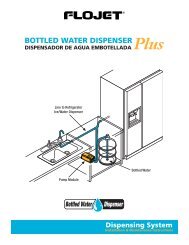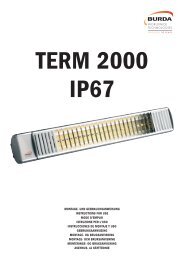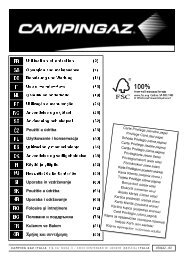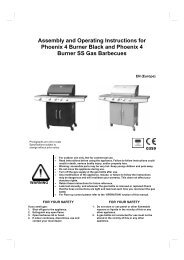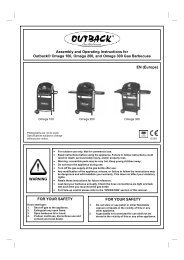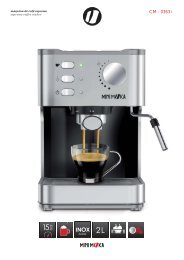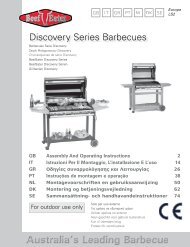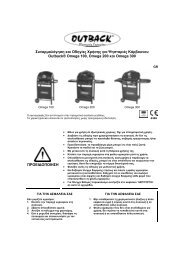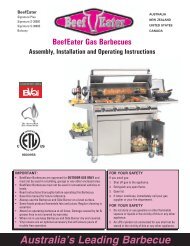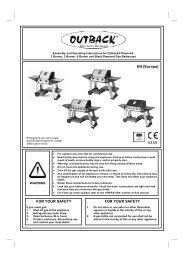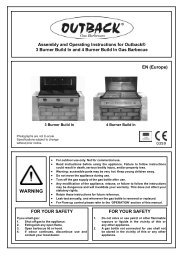You also want an ePaper? Increase the reach of your titles
YUMPU automatically turns print PDFs into web optimized ePapers that Google loves.
Temperature with lid closed: in the full flame ( ) position,<br />
approx. 340 ºC, in the reduced flame position ( ) approx.<br />
175 ºC, with the possibility of adjusting the rate between<br />
these 2 positions.<br />
- Depending on how much food is to be cooked, it is possible<br />
to use only half of the grid, by lighting only one side of the<br />
burner.<br />
- After cooking, close the lid and put the barbecue in the full<br />
flame ( ) position for about 10 minutes, in order to burn<br />
the food residue or grease on the grid or on the lava rock<br />
(self cleaning effect).<br />
- A yellow flame when cooking is normal.<br />
Important :<br />
If a burner flame goes out when the unit is in use, immediately<br />
turn the control knobs to the "off" (l) position, open the lid<br />
and wait 5 minutes to allow the unburnt gas to dissipate. Only<br />
attempt to light again after this time period has elapsed.<br />
� If your apparatus has no lid<br />
- It's recommended that protective gloves be worn to handle<br />
components which may be very hot.<br />
- Before cooking, preheat the barbecue for about 20 minutes<br />
in the full flame ( ) position.<br />
- A yellow flame when cooking is normal.<br />
Important :<br />
If a burner flame goes out when the unit is in use, immediately<br />
turn the control knobs to the "off" (l) position. Only<br />
attempt to light again after this time period has elapsed.<br />
Q Model with burner cap (model without lava rock)<br />
If your barbecue is<br />
equipped with a burner cap<br />
(illustrated above), when<br />
cooking fat meat (chicken,<br />
duck, sausages, etc.), the<br />
burners should be set to<br />
the minimum flow position<br />
( )to reduce flaring up of<br />
cooking fats. It may also be<br />
necessary to reduce the number of items being cooked on the<br />
cooking grid and spread them out over several cooking batches<br />
in succession.<br />
o) Cleaning and maintenance<br />
- Never modify the barbecue: any modification may prove<br />
dangerous.<br />
- In order to maintain your barbecue in perfect operating<br />
condition, it is recommended to clean it periodically (after 4<br />
or 5 uses).<br />
- Wait until the barbecue has cooled down before cleaning.<br />
- Close the gas cylinder.<br />
- <strong>The</strong> grill burner must be cleaned and checked every 3<br />
months. Remove the entire burner and check that no dirt or<br />
spider webs block the venturi tube openings, which may cause<br />
the burner to be less efficient or cause a dangerous gas fire<br />
outside the burner.<br />
- Clean the top of the burner, as well as the sides and base,<br />
using a moist sponge (water with washing up liquid). If<br />
necessary, use a damp steel brush.<br />
- Check that all burner outlets are clear and let dry before<br />
using again. If necessary, use a wire brush to unclog the<br />
burner outlets.<br />
- Clean the orifices on the Venturi jet (see diagram below) or<br />
the burner if necessary.<br />
N.B.: Frequent cleaning of the burner maintains it in good<br />
condition for many uses and prevents premature oxidation,<br />
notably due to acid residue from cooking. Oxidation of the grill<br />
burner is, however, normal.<br />
9<br />
Outlet holes<br />
Venturi tube openings<br />
- Base walls, lid (depending on model), cooking grids,<br />
control panel:<br />
Clean these elements from time to time using a sponge with<br />
washing up liquid. Do not use abrasive products. Do not clean<br />
the grids in a self-cleaning oven; the extreme heat may damage<br />
the chrome plated parts.<br />
- Glass window (depending on model):<br />
Clean from time to time using a glass-cleaning product. If<br />
difficult to clean, remove the glass from its lid and clean it with<br />
an oven cleaning product.<br />
p) Storage<br />
- Close the gas cylinder valve after use.<br />
- If you store your barbecue indoors, disconnect the gas<br />
cylinder and store the cylinder outdoors.<br />
- If you store your barbecue outdoors, it is recommended that<br />
a protective cover be used.<br />
- When not used for a long period of time, it is recommended<br />
that the barbecue be stored in a dry, sheltered place (eg:<br />
garage). <strong>Store</strong> the lava rocks in a dry place<br />
q) Lava rock (Model without burner cap)<br />
- <strong>The</strong> lava rock should be replaced when it becomes heavily<br />
coated in grease or when eroded so that it falls through the<br />
lower grid. This will only happen after it has been used many<br />
times.<br />
Spread the lava rock evenly in a single layer. Do not<br />
pile the rock up and leave a few millimetres between<br />
each rock to allow air to pass through.<br />
Do not use charcoal in place or in addition to the lava<br />
rock provided.<br />
- Use replacement lava rock from Campingaz. We cannot<br />
accept responsability should other lava rock be used, which<br />
could be dangerous to the user.<br />
- Keep the lava rock dry. Do not use wet or damp lava rock,<br />
first allow it to dry in a sheltered area.<br />
r) Glass window (depending on model)<br />
Avoid thermal shocks (cold water in contact with a hot glass<br />
window). Prevent flames from reaching the interior surface of<br />
the glass window (if this happens, lower the flame).<br />
s) Accessories<br />
ADG advises that its gas barbecues should<br />
systematically be used with accessories and<br />
replacement parts from Campingaz. ADG accepts no<br />
responsibility for any damage or malfunction due to<br />
the use of accessories and/or replacement parts from<br />
other brands.<br />
t) Protecting the environment<br />
Think about protecting the environment! Your equipment<br />
contains materials which can be recovered or recycled. Hand<br />
them in to the waste collection service in your municipality<br />
and sort the packing materials.<br />
��



